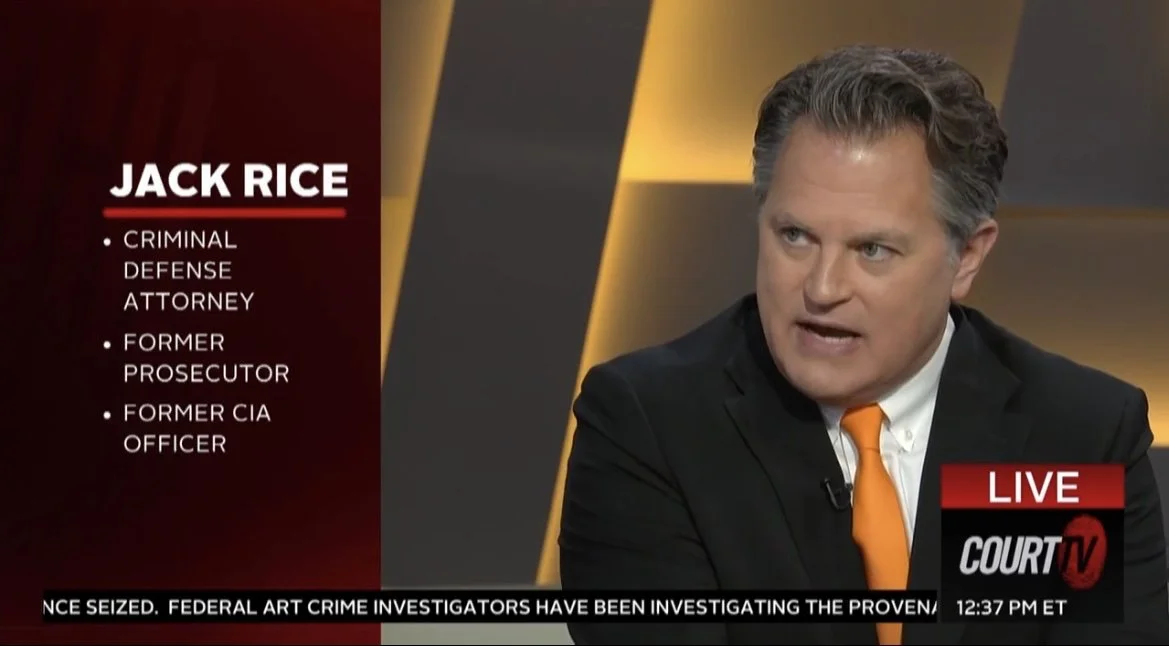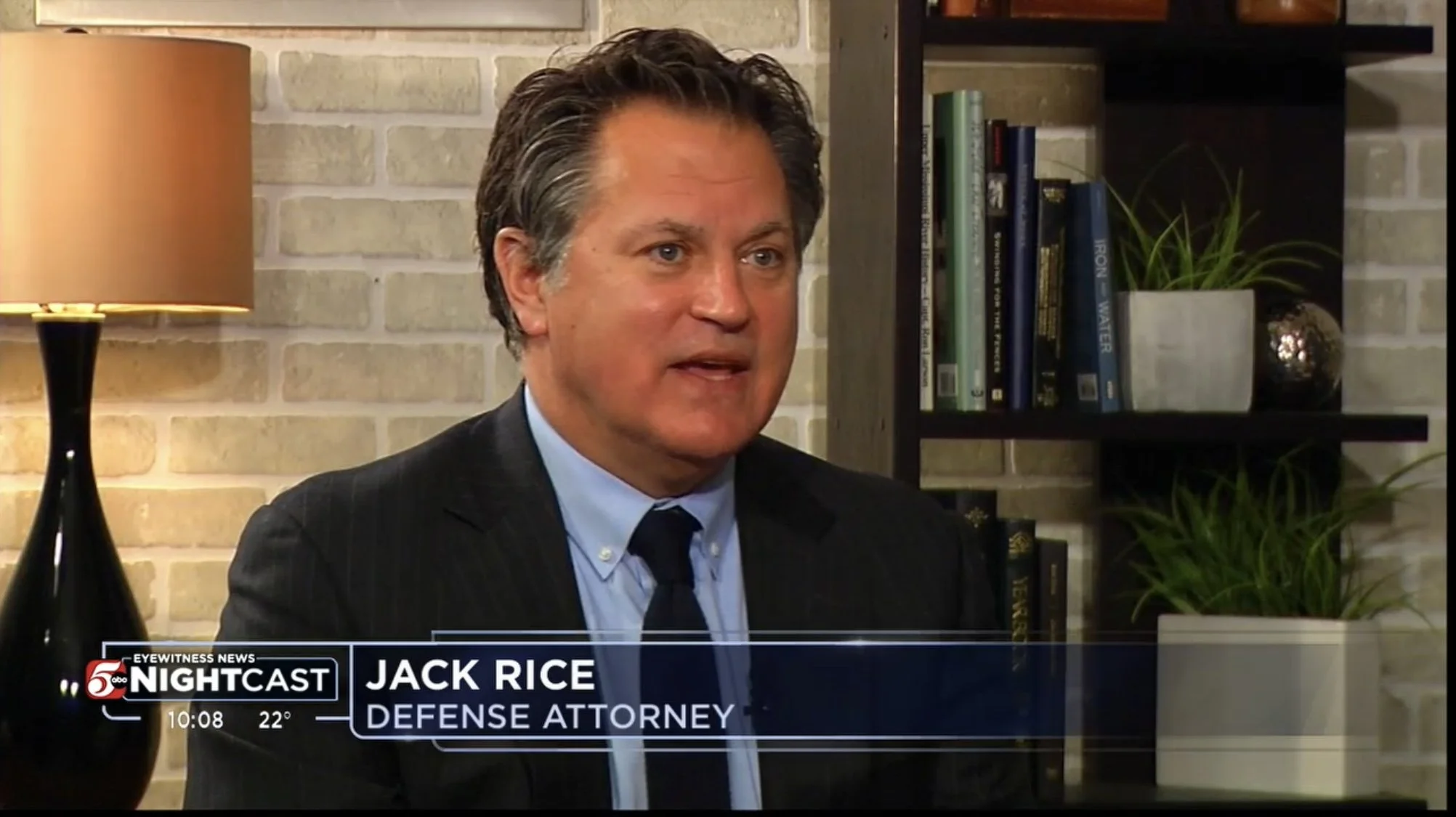
Video FAQ Room
Award-winning St. Paul Criminal Defense Attorney Jack Rice answers your questions.
What Charges Could I Face?
Here in Minnesota State Courts, there are four offense levels:
Petty Misdemeanor: You face a maximum $300 fine with no chance of jail or prison. This is not considered a crime. An example of this is a traffic ticket.
Misdemeanor: You face a maximum of 90 days in jail and up to a $1000 fine. This is considered a crime. Examples of misdemeanors include some theft charges, careless and reckless driving, some first time DWIs, some domestic assault charges, among other charges.
Gross Misdemeanor: You face a maximum of 1 year in jail and up to a $3000 fine. This is considered a crime. Examples of gross misdemeanors include some DWIs, some domestic assaults, obstruction with force, among other charges.
Felony: You may face more than a year and up to life in prison and the fines vary but can be tens of thousands of dollars and more. This is considered the most serious crime. Examples of felonies include terrorist threats, sex crimes, rape, child pornography, serious assaults with weapons, homicide, fourth time DWI, some domestic assaults, among other charges. This is the area where we at Jack Rice Defense spend much of our time.
What Type of Appearances Can I Expect?
Bail Argument: You may be held in custody pending a bail argument. This can be required for most serious felony cases but may likely happen in first time domestic assault charges as well as some first time DWIs and more. The issues the court usually considers are the seriousness of the charges, the potential danger to the public and likelihood to appear for court. These arguments can be complex and some conditional release requirements can be onerous.
Arraignment/First Appearance: You typically appear on these to enter a not guilty plea and acknowledge what you are charged with. In more serious cases, not guilty pleas are delayed until future court appearances.
Pretrial/Omnibus Hearing: This is typically the point where the prosecutor is willing to address possible settlement. We usually have been able to get all of the police reports, videos, documents, etc, to make a more clear assessment regarding the quality of the state’s case. Multiple appearances may be made at this point. Cases may settle at this point although it may depend upon the seriousness of the case.
Contested Hearings: Under certain circumstances, it is necessary to contest the admissibility of certain evidence. A successful result could lead to the dismissal of a case or the exclusion of certain evidence which can dramatically impact the ability of the government to continue the prosecution.
Trial: There are many reasons that require a jury trial or a trial before a judge. There are an equal number of reasons that make a trial a very unwise move. As the case progresses, it is critically important to assess the quality of the government’s case, the possibility of a successful resolution short of trial, and the ramifications of settling vs. the possible ramifications of going to trial. In misdemeanors and gross misdemeanors in state court, we have the right to a six person jury whereas as with felony charges, we face a twelve person jury. Nevertheless, only the person charged can decide whether to go to trial or to resolve a case.
Pre Sentence Investigation (PSI): In the event of resolution short of trial and/or a guilty verdict, a PSI may be required depending upon the type of charge. This is designed to provide the sentencing judge with sufficient information to decide what she or he will do at sentencing. This can be a critical stage and requires great care.
Sentencing: At this point, there are many factors at play. Preparation is fundamentally important to convince the Judge to rule in our favor. As a result, this might be done through negotiation earlier in the case or through specific behavior by a defendant pending the sentencing. Either way, planning and care is key.
Collateral Consequences in Criminal cases: In addition to jail and fines, defendants could face a series of other consequences including loss of gun rights, voting rights and more. In addition, in certain cases including domestic assaults, defendants may also face no contact orders and other limitations. DWIs may face no-use provisions, license ramifications and even vehicle forfeitures. As a result, it is important to understand all of the ramifications of “taking a deal.”
Jack Rice Defense has made thousands of court appearances and has worked in these courtrooms for decades.
How Do I Choose a Criminal Defense Lawyer?
This is a difficult question. However, our advice is to hire someone who specifically practices as a criminal defense lawyer rather than a general practitioner. Also, hire somebody who has handled many cases similar to yours. If you want a trial, find somebody who is an expert in trying cases. We would also suggest finding a lawyer whom you trust. If you can’t have a good working relationship with your lawyer, you will have ongoing problems. Finally, not all lawyers are the same. Experience, talent and capability don’t happen over night. If the consequences you face are severe, contemplate how much you lose if your case goes South. When you absolutely need the best criminal defense attorney, sit down with award winning criminal defense lawyer Jack Rice..
How does my lawyer build a criminal defense case?
In order to properly build a three dimensional criminal defense case, your lawyer must:
Establish a lawyer-client relationship with you and your family.
Appear with you at every stage of your case from bail argument to first appearance, pretrials, contested pretrials, trial proceedings and probation hearings.
Work with specialists including forensic scientists, psychologists, and counselors to support your defense claims and to determine other weaknesses in the government’s case.
Thoroughly examine all of the government’s evidence to determine what is true, half-true and absolutely false. This is a critical step in order to determine the strengths and weaknesses of the government’s case. Remember that the police can absolutely lie to you and the court has continued to sanction that behavior.
Establish any new evidence in your favor including witness testimony that may be presented at trial.
What happens if I haven't been charged?
Sometimes, before you have been charged is the best time to have counsel beside you.
Before the state has locked in charges or they are still investigating, your lawyer can help protect you from police interrogations and investigations. We have represented clients pre-charge in relatively minor criminal cases all the way up to rape and murder.
In fact, frequently, it is in this area of sex crimes and we have spent enormous amounts of time and have gained true expertise.
We can’t count the number of times that we have had clients charged based exclusively upon their statements to the police. Know your rights and making no statements without representation.
If you find yourself in this situation, contact Jack Rice Defense immediately using the information below.
Why Should I Hire an Experienced Criminal Defense Lawyer?
Can Criminal Charges Jeopardize My Professional License?
How do I get the help I need?
To reach Jack Rice Defense immediately, call 651-447-7650 or 612-227-1339 or fill out our simple contact form. The consultation is free. If you or a loved one has been charged with a crime, it is critical that you consult with a Minnesota criminal defense lawyer as soon as possible. Even if the charges seem inconsequential, the ramifications may be much worse than you even know. However, Jack Rice Defense absolutely knows and together, we can do something about it.






